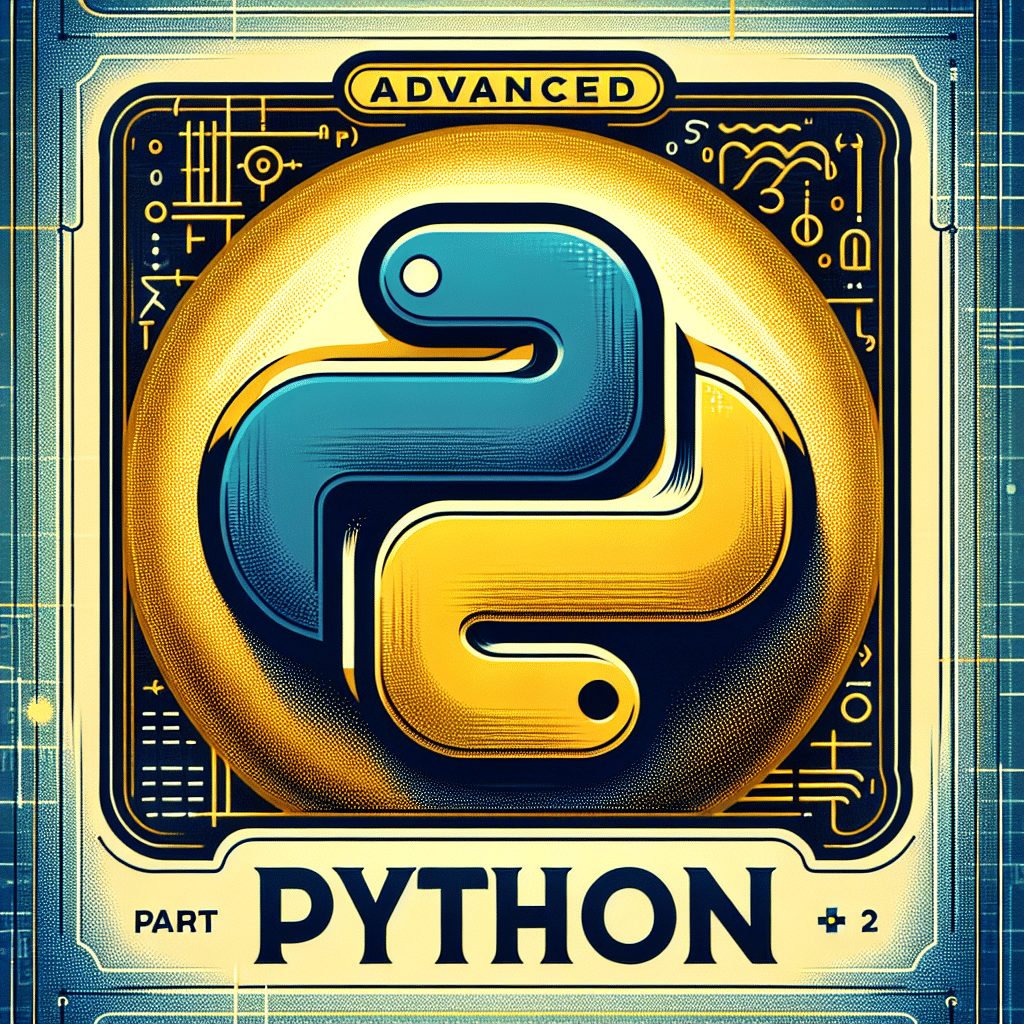🎓 This is the second part of the Python Programming course designed to enhance your Python skills through advanced concepts and practical applications. 💡 The course covers essential topics including data handling, code organization, testing, debugging, and performance optimization, all taught through hands-on examples and exercises. 🚀 By the end of this course, you'll be equipped with the knowledge to build real-world applications, implement best practices, and write more efficient and maintainable Python code.
🎓 Advanced Python Programming - Part 2 is a comprehensive course designed to elevate your Python programming skills to the next level. The course builds upon fundamental knowledge and delves into sophisticated concepts and techniques essential for professional Python development.
💻 You'll master data handling techniques, learning to work with various file formats, databases, and APIs. The course emphasizes code organization and best practices, teaching you how to structure your projects efficiently using modules, packages, and virtual environments.
🔍 Understanding the importance of code quality, you'll learn testing methodologies and debugging techniques that are crucial for developing robust applications. The course covers performance optimization strategies, including profiling, benchmarking, and memory management.
🚀 Throughout the learning journey, you'll apply your knowledge to real-world applications, creating command-line tools, web scrapers, REST APIs, and desktop applications. Each topic is reinforced with practical examples and hands-on exercises designed to strengthen your understanding.
🎯 By the completion of this course, you'll be equipped with advanced Python programming skills, enabling you to write more efficient, maintainable, and professional-grade code. The knowledge gained will prepare you for tackling complex programming challenges and building sophisticated applications in real-world scenarios.
Would you like me to show you the complete course content?
🎯 What You'll Learn in This Course
📊 Master advanced data handling techniques by working with various file formats, databases, and APIs. You'll learn to efficiently process, store, and manipulate data in real-world applications.
🏗️ Develop expertise in code organization by learning professional-grade techniques for structuring your projects using modules, packages, and virtual environments. You'll understand how to maintain clean, scalable, and maintainable code.
🔍 Gain proficiency in testing and debugging methodologies essential for professional development. You'll learn to write effective unit tests, implement logging, and use debugging tools to identify and fix issues efficiently.
⚡ Master performance optimization techniques including profiling, benchmarking, and memory management. You'll learn how to write faster, more efficient code and handle concurrent operations effectively.
🚀 Build practical real-world applications including command-line tools, web scrapers, REST APIs, and desktop applications. You'll apply your knowledge to create functional, professional-grade software solutions.
🎨 Learn industry-standard best practices for writing clean, documented, and maintainable code. You'll understand PEP 8 guidelines, documentation standards, and code organization principles.
🔄 Develop skills in asynchronous programming and understand how to handle concurrent operations efficiently. You'll learn to write non-blocking code that can handle multiple tasks simultaneously.
🛠️ Master advanced Python tools and frameworks used in professional development environments. You'll gain hands-on experience with essential development tools and libraries.
🌟 Course Features:
📚 Comprehensive Learning Structure
- Carefully structured modules and lessons
- Progressive learning path from intermediate to advanced concepts
- Clear learning objectives for each lesson
💻 Hands-on Practice
- Interactive exercises after each lesson
- Real-world examples and use cases
- Practical projects that reinforce learning
🔄 Flexible Learning
- Self-paced learning environment
- Option to revisit and review previous lessons
- Modular structure allowing focus on specific areas of interest
🛠️ Technical Features
- Compatible with Python 3.11
- Up-to-date with current industry standards
- Focus on modern development tools and frameworks
📊 Progress Tracking
- Regular knowledge checks
- Exercise feedback system
- Performance assessment throughout the course
🤝 Support and Resources
- Detailed code examples
- Debugging guidance
- Best practices recommendations
- Documentation standards
🏆 Skill Development
- Professional-grade coding techniques
- Industry-standard tools and practices
- Performance optimization strategies
- Testing and debugging methodologies
🎯 This course is specifically designed for:
👨💻 Intermediate Python developers who have already mastered the basics and are ready to advance their skills to the next level.
🎓 Software engineering students who want to deepen their understanding of professional Python development practices and enterprise-level applications.
💼 Professional developers transitioning to Python from other programming languages who need to quickly grasp advanced concepts and best practices.
🔄 Backend developers looking to enhance their Python skills for building more efficient and scalable applications.
🛠️ DevOps engineers who need to write and maintain complex Python scripts and automation tools.
🎯 Prerequisites: This Course is Perfect For You If...
💡 You're comfortable with Python basics including variables, data types, control structures, functions, and basic object-oriented programming concepts. You should be able to write simple Python programs and understand basic error messages.
🔄 You have experience working with basic data structures like lists, dictionaries, and sets in Python, and you're familiar with common built-in functions and methods.
⌨️ You possess basic knowledge of working with the command line interface and can execute Python scripts from the terminal. Understanding of basic file operations and directory navigation is essential.
🎓 You understand fundamental concepts of object-oriented programming including classes, objects, inheritance, and encapsulation. Experience with creating and using classes in Python is necessary.
🔍 You have some experience with error handling using try-except blocks and can perform basic debugging of your code. Understanding of how to read Python error messages is important.
🌐 You're familiar with basic version control concepts (like Git) and have some experience with package management using pip. Knowledge of virtual environments is helpful but not required.
📚 You have a working knowledge of basic algorithms and data structures, and you're comfortable with reading and understanding documentation and technical specifications.
- File handling, data formats, APIs, and database integration
- Modules, packages, virtual environments, and coding standards
- Unit testing, debugging techniques, and error handling
- Profiling, memory management, and concurrent programming
- Building practical applications with Python
